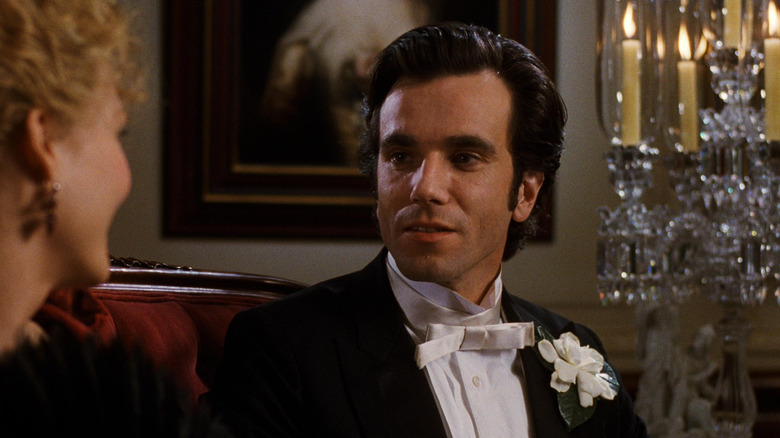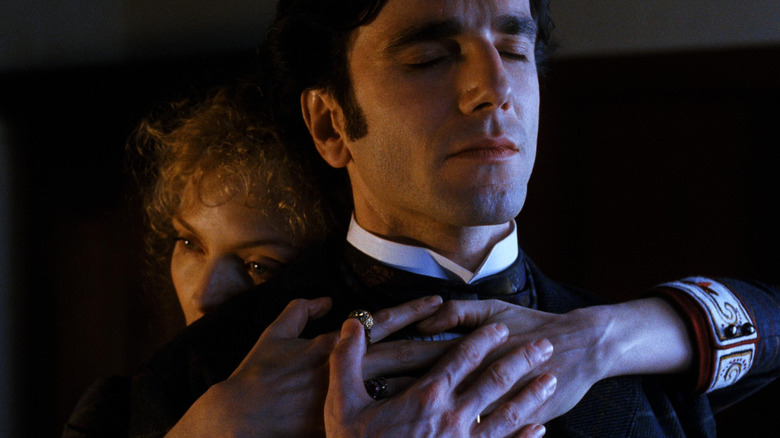Daniel Day-Lewis' Forgotten 1993 Romance Movie Deserves More Love
This is going to sound utterly absurd, but there was indeed a time when the great Daniel Day-Lewis worked with some degree of regularity. Between 1988 and 1989, he appeared in a whopping four movies: "The Unbearable Lightness of Being," "Stars and Bars," "Eversmile, New Jersey," and "My Left Foot," which earned him his first Academy Award for Best Actor. Then, in 1993, he pulled off another two-fer by appearing in a pair of superb, high-profile movies that are emotionally charged in very different ways.
"In the Name of the Father" reunited Day-Lewis with his "My Left Foot" director Jim Sheridan for the fiery true-life tale of four men who were wrongly accused of having carried out the Guildford pub bombings in 1974. This was Day-Lewis in righteous indignation mode, battling to clear not just his own name but his father's as well. The movie received rapturous reviews and racked up seven Academy Award nominations (losing out in most categories to the Oscar juggernaut that was "Schindler's List").
Day-Lewis' other 1993 film was expected to be a major Oscar contender as well, but while it did wind up with five nods, it got snubbed in the top categories. Why? As a lavishly produced romantic drama, many viewers thought it was too emotionally restrained. This is preposterous.
Martin Scorsese's adaptation of Edith Wharton's novel "The Age of Innocence" is a masterpiece of heartbreaking repression. Set in 1870, the film finds the inveterate cinematic chronicler of New York City investigating the stifling propriety observed by wealthy clans who treated marriage as a transaction wherein their financial interests were furthered. Love was a secondary consideration.
This was Day-Lewis' first collaboration with Scorsese, and he is magnificent in it. However, it wouldn't reach such towering heights were it not for its supporting cast.
Daniel Day-Lewis is a heartbreaker in The Age of Innocence
Day-Lewis stars as Newland Archer, a successful, well-thought-of lawyer who comes from old money. He plans to marry May Welland (Winona Ryder), a lovely, kind, and loyal member of another old-money family. Though there's clearly some warmth between the two (May positively adores Newland), this is quite clearly a merger. And when Newland finds himself taken with May's scandalous cousin Countess Ellen Olenska (Michelle Pfeiffer), that merger is jeopardized in ways that's meet with witheringly quiet disapproval.
There are few histrionics in "The Age of Innocence." For some people, this makes it a frigid experience. I couldn't disagree more. Watching these stellar actors — along with a brilliant supporting cast that includes Geraldine Chaplin, Michael Gough, and Miriam Margolyes — strain to find eloquent, socially acceptable means of expressing their deepest desires is a stirring experience. Newland loves May, but once Ellen turns up, the young naïf can't hold his interest. Ellen is an independent woman who challenges Newland intellectually. Romantically, they're a perfect match. Alas, the divorced Ellen is a societal outcast, so marrying her would damage Newland's standing in their closed old-money circle.
Visually, "The Age of Innocence" is a time machine. Dante Ferretti's production design is dense with period detail, while Gabriella Pescucci's costumes flatter Scorsese and Ellen Lewis's expertly chosen cast. And the great Elmer Bernstein comes through with a lush orchestral score that expresses what Scorsese's characters would never dare voice themselves. The final cue before the end credits is an explosion of feeling, conveying Newland's sorrow, yearning, and gratitude in a melodious manner that's difficult to bear. If you pay attention to the fine details of "The Age of Innocence," you might walk away believing it to be one of Scorsese's best.

